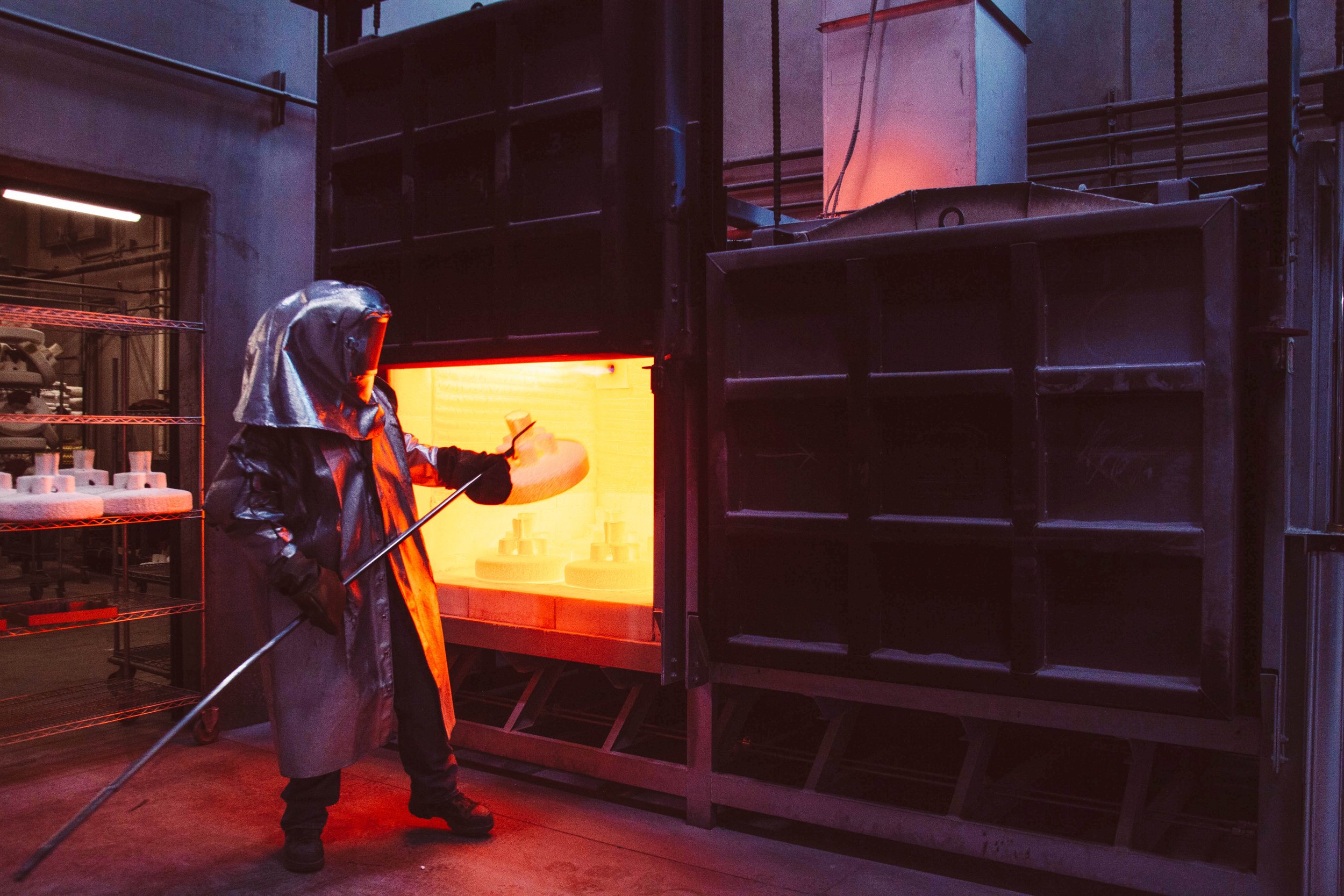Casting around the Clock
Precision Casting
Day in - Day Out
Home to two stateside foundries and with international casting partners, the IPC Foundry Group is primed to meet all of your metalworking needs, from precision parts to product development and everything in between.
A Partner You Can Count On
45 Years of Precision
Casting Experience
We’ve been providing quality castings to customers throughout the United States and Canada for over 40 years. From our early days, when we provided equipment for local agricultural companies, to producing millions of metal parts with footprints in dozens of industries, we’ve built a rock-solid reputation for doing things right.
We love what we do, and you’ll be hard-pressed to find a better partner for all of your metalworking needs.
Production Made Easy
Get Started in 3 Easy Steps
01
Get in Touch
Whether you have a market-proven product or you’re still in the development stages, contact our expert team to see how our production and engineering teams can get you to market with precision parts ASAP.
02
Quoting and Onboarding
We don't believe in a cookie-cutter approach to casting. Our engineering and production teams will work with you to seamlessly onboard your project, optimize our production process to scale to your needs, and meet all of your production goals.
We've got you covered if you need help with prototyping, testing, or secondary operations!
03
Perfect Precision Cast Parts
We’ll hit the ground running and deliver your precision cast components right when you need them. Take the stress out of production and rest easy knowing IPC is a partner you can count on!
Our Process
How Precision Casting Works
Precision casting, also known as investment casting, is a form of metalworking ideal for creating intricate and complex metal parts.
The process involves creating a wax or plastic pattern of the part, which is then coated in a ceramic shell that will eventually serve as a mold for molten metal.
Precision casting allows for exact, repeatable metal forming that when coupled with modern advancements and automation, allows for cost-effective bulk production of metal parts for any industry.
Follow along with us below as we explore the process from start to finish.
01
3D Modeling & Onboarding
Before casting work begins, our team will take your existing product diagrams/3D models and optimize our equipment and production process to fit its nuances. This critical step allows us to produce as efficiently as possible while guaranteeing precise results.
If you don’t have fully developed 3D models, that’s okay! Just send us an existing part, prototype, or even a sketch, and our engineering team can work with you to ensure that it meets your needs.
IPC is your prototyping partner! If you need rapid prototyping services, we can often deliver first articles in as little as two weeks.
02
Tooling/Mold Making for Wax Injection
With completed 3D model(s) in hand, we’ll create tooling for our wax injection machines. The resultant molds will be used to precisely replicate wax models of your part repeatedly (hundreds or thousands of times over).
We’ll keep these molds for future production runs, or, if you wish, we’ll send them to you after your production run has concluded.
Once tooling is completed, full-scale production begins with the wax injection process.
03
Wax Injection, “Trees”, & “Gates
We utilize state-of-the-art wax injection machines to create 1:1 scale models of your part. But we’re not done yet. Our engineering team works behind the scenes to develop optimal “trees” and “gates” for your part.
”Trees” are a collection of wax models that we can ‘stitch’ together to produce multiple parts in one go. ”Gates” allow us to pour molten metal into our tree of parts. (see photo above).
Our production team utilizes our wax injection machines to create the perfect combination for your part(s) and facilitate a rapid, seamless production cycle.
04
Ceramic Slurry
Your wax models, configured into “trees” and “gates,” are next dunked into a ceramic slurry. At IPC, this entire process takes place in a climate-controlled room with custom robotics to allow consistent quality and a 24/7 production window.
After dipping, the parts are run through a rainfall sander and coated in a particulate that allows for solid ceramic shells to maintain your parts’ precise shapes during the metal pouring stage.
This process is repeated several times to ensure optimal casting.
05
Dry and Repeat
Utilizing our robotics, we continually dip and dry your parts around the clock. In our foundries, we introduced conveyor systems that allow optimal production flow.
Your parts will be dipped, coated in particulate, and placed on the conveyor in one continual action. When one part is completed, another begins. The dipping process will continue until your ceramic shell is perfect for upcoming casting.
At IPC, your production moves forward 24/7 like clockwork.
06
Burnout
When ceramic shells are sufficiently strong, finished part clusters are moved into our flashfire burnout systems (think autoclave).
These energy-efficient machines allow for rapid burnout of the wax models inside the ceramic shells. Nearly 99% of the wax is reclaimable from this process, enabling us to reduce our environmental impact and repurpose or recycle it for future projects.
Following burnout, hollow ceramic shells are staged for metal pouring in our foundry.
07
Superheating
Hollow ceramic shells are placed, brought into the foundry, and superheated in our industrial ovens. This allows for optimal metal pouring conditions for your selected alloy.
08
Metal Pouring
Your molten alloy of choice is poured through the “gate” and into your “tree” of parts, allowing us to cast multiple metal components in one go.
The molten metal fills every inch of the ceramic shell into a perfect model of your part. Any imperfections move up and out through the gate as the pour completes. As the metal begins to cool, your part solidifies.
09
Cooling and Shell Removal
After pouring, your part cools, and most of the shell sluffs off. Once cooled, any remaining ceramic is removed, and your parts are ready for clean-up and finishing work!
10
Gate Removal and Touch-Up
Precision casting allows for intricate metal work, including thin walls, complex surface finishes, internal cavities, overhangs, etc., with little to no finishing work necessary. While there is little to clean up, we still need to separate parts from their “gates” and “tree” clusters into standalone components.
Once again, using robotics, parts are separated and inspected to match our quality standards and your specifications.
Now, they are ready to ship or engage in secondary and tertiary finishing work.
11
Other Finishing Work
Depending on your customer’s needs, your specifications, or industry standards, your part may require additional finishing work such as plating, heat treating, painting, stamping, anodization, machining, certification, strength testing, etc.
IPC is a one-stop shop for all of your metalworking needs. Once casting work has concluded, we’re happy to utilize our foundry network, finishing and testing partners, and all our resources to prepare your part(s) for the market.
12
Shipping
Your parts are shipped to you after any necessary finishing work is completed!
Metalworking 101
When Should I Use
Precision Casting?
Multiple metal forming techniques exist, each with unique perks. Below, we’ll briefly explain sand casting, machining, and precision casting and recommend why you might choose one method over another.
01
Sand Casting
Sand casting utilizes molds, but, instead of using a ceramic slurry or wax, two-piece molds are fashioned by compressing sand and clay.
Sand casting is an economical metal forming method that is ideal for small production runs. This method is particularly useful during the development or prototyping stages, or when product updates are frequent, as it allows for inexpensive and straightforward modifications to part designs. Moreover, sand casting imposes no size constraints, making it an excellent option for pouring very large parts.
Sand Casting May Be the Right Fit If:
You are producing a small number of parts
You have a large metal part (over 75 pounds)
Your part is not complex in design (no thin edges or intricate components)
You are prototyping, and designs are likely to change
02
Machining
Metal machining is a precise process using cutting tools to create intricate components with tight tolerances. CNC technology is often used to produce customized and complex shapes with high accuracy and repeatability. It works with various metals, including aluminum, steel, and titanium, for a wide range of applications.
Machining can be pretty expensive, but it is an excellent choice when you require next-level precision.
Machining May Be the Right Fit If:
You are producing a small/medium number of highly detailed parts
Your part is very detailed with very tight tolerances
You need multiple detailed parts quickly
03
Precision Casting
Precision casting utilizes wax molds and ceramic shells while metal forming. You get the strength of traditional cast metal with extreme precision, detailed surface finishes, and the ability to cast intricate designs (internal cavities, steep overhangs, etc.), all while requiring little to no finishing work.
Precision casting has more expensive upfront costs than sand casting. Still, if you are producing a large volume of parts, it is likely to save you money in the long run due to significantly reduced finishing requirements. It also allows you to create complex parts that may be unachievable through sand casting.
Precision Casting May Be the Right Fit If:
You need to produce hundreds or thousands of metal parts reliably
Your part has complex dimensional tolerances and/or thin walls
You require a smooth surface finish
You’d like to include your logo or text on your part
You want to produce parts with less finishing requirements and associated cost
Why Choose IPC?
Your One-Stop
Precision Casting Shop
50+ Years of Experience
Richly Experienced Domestic Foundries
We proudly operate two modern foundries, strategically located in Texas and Utah.
Top-notch casting solutions and a seasoned team
Dozens of machining, testing, and finishing partners throughout the US
Massive selection of alloys
Rapid Prototyping capabilities
Turn-key solution for all secondary operations (heat treating, mold making, testing, painting, anodizing, machining, and more)
Deep experience in dozens of industries
Simplify your supply chain needs with IPC Foundry Group - your one-stop-shop for all things metalworking.
Always Adaptable
Scalable Casting Solutions
IPC frequently invests alongside clients, streamlining the qualification and onboarding process. Our cooperative approach involves understanding our client's needs and customizing our services to meet their unique requirements.
24/7 Production Cycle at two domestic foundries
International partners for cost-sensitive solutions
Lightning-fast Lead Times
First articles in as little as two weeks
Scalable casting solutions for midsize and large corporations
Modular manufacturing - we grow and update facilities based on your requirements
Dependable by Default
More than a Short-Term Solution
The IPC Foundry Group has been providing quality castings in Texas since 1975 and Utah since 1980. No worries about closing shop or inexperience.
Committed to the future of investment casting (custom robotics, automation, machine learning, and more.
Work with us to secure UL, CE, and other necessary certifications
Build back Better with an all-American production team
Centralized locations for shipping anywhere in the US
Dedicated production team (sales, engineering, casting) for every project
Take us for a spin!
Tour an IPC Foundry
Before committing, test the waters! Book a free tour of our Utah or Texas facilities and see our automation, equipment, and processes firsthand.
Meet with our expert staff, who can answer your questions and show why the IPC Foundry Group is the perfect fit for your casting needs.


















